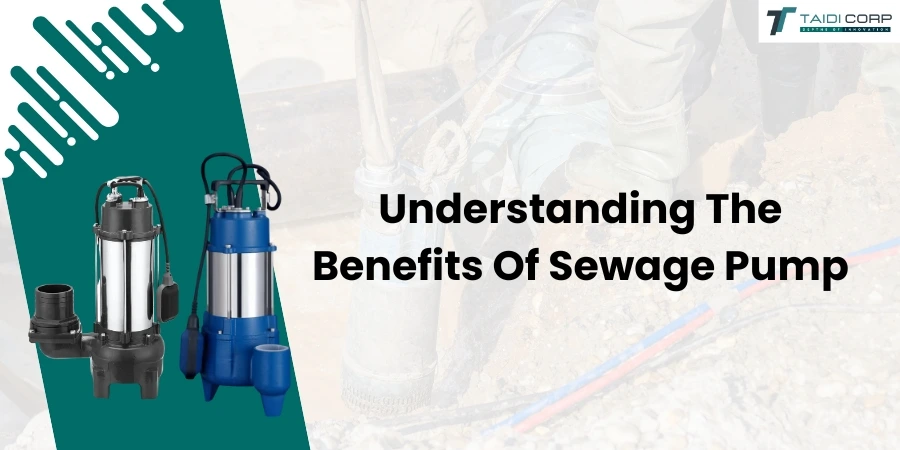
Sewage pumps play a vital role in moving wastewater from lower to higher elevations, ensuring your property’s plumbing system functions efficiently. Whether you’re a homeowner, property manager, or prospective homebuyer, understanding the need for a sewage pump is essential to prevent plumbing issues and maintain property value. This guide will walk you through the key benefits, requirements, and considerations for choosing the right sewage pump for your property.
What is a Sewage Pump?
A sewage pump is a specialized pump designed to move wastewater from lower areas, such as basements, to the main sewer line or septic system. It’s often used in properties with below-grade plumbing, where gravity alone isn’t sufficient to move waste. These pumps are a crucial part of wastewater management, preventing backups and ensuring that your plumbing system operates smoothly.
Purpose of This Guide
This guide aims to help you determine if you need a sewage pump by providing a comprehensive overview of when a pump is necessary, the benefits it offers, and the requirements for installation.
Who Should Read This Guide?
This guide is ideal for:
- Homeowners with basements or below-ground plumbing.
- Property managers and landlords responsible for wastewater management.
- Prospective homebuyers researching plumbing systems.
- DIY enthusiasts interested in home renovation and plumbing upgrades.
When is a Sewage Pump Necessary?
Not every property needs a sewage pump, but in specific circumstances, it becomes an essential part of your plumbing system. Let’s explore when you might need one.
Properties with Below-Grade Plumbing
If your home has a basement bathroom, laundry room, or any plumbing fixture below the main sewer line, a sewage pump is necessary to transport wastewater upwards to the main system. Without a sewage pump, gravity alone won’t suffice.
Septic System Installations
Homes with septic systems sometimes require a sewage pump to move wastewater from the property to the septic tank, especially if the tank is located uphill from the house.
Flood-Prone Areas
Living in an area prone to heavy rainfall or with a high water table increases the risk of backups and flooding. A sewage pump can help safeguard your property by keeping wastewater flowing efficiently during storms.
Commercial Properties
Commercial buildings with complex or high-usage plumbing systems benefit from sewage pumps that can handle larger volumes of waste. Installing the right type of pump ensures the system can manage peak usage without causing backups.
Key Benefits of Installing a Sewage Pump
Prevents Backups and Flooding
One of the most significant advantages of a sewage pump is that it prevents costly and unpleasant backups in your basement or other low-lying areas. This is especially important in flood-prone regions where sewage backups can cause extensive water damage.
Supports Additional Plumbing Fixtures
If you’re considering adding a basement bathroom, laundry room, or kitchen, a sewage pump allows for smooth wastewater removal. Installing one makes it possible to expand your living space and improve your home’s functionality.
Improves Property Value
A well-functioning sewage pump enhances your property’s value by ensuring that its plumbing system is equipped to handle additional wastewater management needs, which is a valuable selling point for prospective buyers.
Efficient Waste Management
Sewage pumps ensure that your property handles wastewater efficiently, preventing potential damage to your home or property due to plumbing issues.
Types of Sewage Pumps and Their Applications
There are different types of sewage pumps, each with specific functions depending on your property’s plumbing needs. Understanding the type that’s right for you is essential for making an informed choice.
Submersible Sewage Pumps
Designed to operate underwater, submersible pumps are commonly used in residential properties with basement bathrooms. They are effective and quiet, making them a popular choice for homeowners.
Effluent Pumps
Effluent pumps handle gray water from sinks, showers, and washing machines and are often used in septic systems. These pumps are ideal if you have a lot of wastewater from these sources.
Grinder Pumps
Grinder pumps are designed to break down solid waste into smaller particles, making them perfect for properties with long discharge distances or uphill installations. They help avoid clogs and ensure efficient waste movement.
Sewage Ejector Pumps
Typically used for basement bathrooms, sewage ejector pumps lift wastewater to the main sewer line. These pumps are essential when plumbing fixtures are below the sewer level.
Requirements for Installing a Sewage Pump
Proper Location and Space
When installing a sewage pump, you need to ensure there’s adequate space in the basement or utility room for both the pump and the basin. Correct placement is crucial for long-term performance.
Electrical Access
Sewage pumps require electrical power, and it’s recommended to have a dedicated GFCI outlet or a hardwired connection for safety reasons.
Ventilation and Safety
Proper ventilation is necessary to prevent gas buildup, and safety features like alarms can alert you to high water levels or pump failures. This adds an extra layer of security to your home.
Discharge Line Considerations
The discharge line must be correctly sized and routed to avoid blockages and ensure wastewater is removed efficiently. Professional installation ensures these factors are addressed.
Cost Considerations for Sewage Pump Installation
Initial Purchase and Installation
The cost of a sewage pump system varies depending on the type of pump and any necessary plumbing modifications. However, it’s important to weigh the initial investment against the long-term protection and functionality it offers.
Maintenance and Operating Costs
Regular maintenance is crucial to avoid costly repairs. The energy consumption of sewage pumps is relatively low, but periodic professional servicing will keep your system running efficiently.
Potential Savings
While there are upfront costs, a properly installed sewage pump can save you thousands by preventing water damage and boosting your property’s value.
Maintenance Requirements for Optimal Performance
Regular Inspections
Perform monthly visual checks to catch any early signs of wear or damage.
Annual Professional Servicing
Hiring a licensed plumber for annual inspections will ensure the pump remains in good condition and can prevent major breakdowns.
Cleaning the Pump and Basin
Regular cleaning will prevent clogs and debris buildup in the pump and basin, ensuring smooth operation.
Testing the Float Switch and Backup Systems
Ensure the float switch, which triggers the pump, moves freely, and check that any backup systems are functional to avoid unexpected failures.
Common Myths and Misconceptions about Sewage Pumps
Myth 1: Sewage Pumps are Noisy and Unreliable
Modern sewage pumps are designed to be both quiet and efficient, so noise shouldn’t be a concern.
Myth 2: Sewage Pumps are Only for Commercial Properties
Sewage pumps are also common in residential properties with below-grade plumbing. They aren’t limited to commercial use.
Myth 3: Sewage Pumps Require Constant Maintenance
While maintenance is necessary, regular upkeep isn’t time-consuming or costly, especially with professional inspections.
Deciding If a Sewage Pump is Right for Your Property
Evaluating Your Needs
Assess your property’s plumbing layout, elevation, and wastewater needs to determine if a sewage pump is necessary.
Consulting a Professional
For an accurate assessment and installation, consult a plumbing professional to guide you through the process.
For more information about products that can improve your plumbing system, check out our sewage pump options.
Conclusion
A sewage pump is a smart investment for properties with below-grade plumbing or complex wastewater management needs. From preventing backups to increasing property value, it offers numerous benefits. Take the time to assess your property and consult with a professional to ensure you choose the right system for your home.
